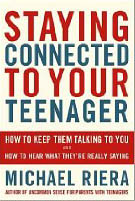
 Staying Connected to Your Teenager
Staying Connected to Your TeenagerHow to Keep Them Talking to You and How to Hear What They're Really Saying
Review posted October 12, 2008.
Perseus Publishing, 2003. 275 pages.
Starred Review.
2008 Sonderbooks Stand-out: #2 Nonfiction, Personal Growth
This book resonated with me. My sons are 20 years old and 14 years old, and this book gave me good tips for dealing with both of them. My older son just graduated from college, and my younger son is starting high school. They're growing past disciplinarian concerns. Michael Riera puts into words what I really want in my relationship with my sons -- connection.
His introduction says it well:
I respect teenagers a great deal, and I respect the parents of teenagers even more. Nothing in a parent's life is more trying, confusing, and frustrating than raising a teenager. They are moody, self-centered, and full of mixed messages; at least that's the way normal, healthy teenagers behave. That will not change. As the parent of a teenager, you know all too well that your job entails setting limits, having big talks, enforcing consequences, helping them to learn from their mistakes, and putting them on course for a happy and successful adulthood. Talk about an exhausting task.
What I find curious, however, is that hardly anyone ever mentions the importance of staying connected to our teenagers throughout their adolescence. Given the enormous To Do List from the previous paragraph, why isn't anybody addressing practical ways of staying connected to our teenagers throughout this trying time? From a practical perspective, all the items on your To Do List are handled more efficiently, more effectively, and more pleasantly when you are connected to your teenager. For instance, research has shown that the emotional connection between adolescent girls and their parents (especially their mothers) significantly delays the onset of sexual activity. When you are connected, everything else comes more easily and naturally. And when they do misbehave -- as they will -- nothing worthwhile can happen until your connection is reestablished. The number one complaint of the parents of teenagers is a lack of communication with their teenagers, but even in the face of this, if you are paying attention, thinking creatively, and maintaining your curiosity, your connection will hold steadfast despite the lack of regular heart-to heart talks.
Beyond effectiveness, there is another reason to maintain your connection with your teenager: It's fun. Teenagers, for better and worse, are some of the most creative and fun people on the planet, and when you stay connected you, too, enjoy these aspects of your teenager; and in doing so, you regularly replenish your parenting batteries. Besides, sharing humor itself promotes connection. Or, as the humorist Victor Borge once said, "Laughter is the shortest distance between two people."...
This book looks directly at the connection between parent and teenager, and aims to give you solid, practical advice, ensconced in psychological and developmental research, on how to understand and how to improve the quality of your relationship with your teenager.
Indeed, Michael Riera succeeds brilliantly at making this a practical, encouraging book. I was reading the chapter "Extend the Comfort Zone," right when I was ready to take my son to get his driver's license. It so happens that a teen learning to drive is a prime example of a teen expanding his comfort zone in order to learn new skills.
By the end of a story like this, parents have a much better sense of what a comfort zone is and how and why their teenagers would choose to expand it. It's important that, as a parent, you are successful in supporting your teenager in expanding her comfort zone, because whenever you do so you deepen the connection you already have with her. If, however, you push too hard or are too cautious, you miss golden opportunities. Striking the right balance in this arena is an art form.
Reading Michael Riera's advice was just in time to help turn the trip to the Department of Motor Vehicles into a positive experience between my son and me.
This book is positive and encouraging. It shows you how you can use your own common sense to help your teen learn to use his own common sense. I like the way Michael Riera encourages you to get your teens focusing on their own integrity. They know how they should act -- if you tell them how they should act, they probably won't want to do it, though.
I think I'm going to buy myself a copy of this book, so I can refer back to it often in the next several years. It is wise, encouraging, and practical. And it helps you see what you truly want your teen to grow into -- a responsible adult with opinions of his own, who still loves and cares about you, and enjoys discussing those opinions with you.
Here are some excellent quotations from the book, posted on Sonderquotes.

